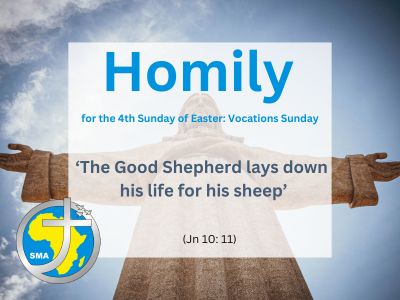Readings: Acts 4:8-12; 1 Jn 3:1-2; John 10:11-18
Theme: ‘The Good Shepherd lays down his life for his sheep’ (Jn 10:11)
Today is the World Day of Prayer for Vocations, a day on which the Church invites us to reflect on the meaning of God’s call and to pray for vocations to the service of the Church and its mission. To help us reflect on the meaning of vocation – a call to serve others – today’s Gospel, presents us with the figure of Jesus, the Good Shepherd. One of the most popular images of pastoral care is that of the shepherd who watches over his flock, leads them to green pastures, and protects them from harm. And it is this striking image that Jesus develops to convey his loving care for those to whom he has been sent by his Father.
In biblical times there were two kinds of shepherds. There was the hired hand for whom minding the sheep was merely a job. He would move from one flock to another, depending on the conditions of service, but would never dream of risking his life for the sheep. As soon as he was a wolf or a thief approaching, he would flee for dear life and leave the flock to the mercy of the marauders. ‘This is because he is only a hired man and has no concern for the sheep’ (Jn 10:13). Then, there was the shepherd-owner of the flock who stayed with the same flock all his life. He knew every sheep in his flock individually. He could call each one by name and was familiar with its life-story – when and where it was born, the difficulties it had gone through, its temperament and particular traits. Growing up on a small farm in 1950s Ireland, I had first-hand experience of this kind of farmer who cared for, and interacted with, the animals (mainly our cows) that provided our livelihood. Sadly, these farmers have long since been replaced by technocratic farmers who tend to their animals by remote control.
The shepherd-owner to which Jesus compares himself was devoted to his sheep. He knew the one likely to lag behind the others on a long trek, and he would lift it up and carry it on his shoulders, or in his arms. He knew the one that tended to stray from the flock, and he kept his eye out for it when passing through dangerous terrain. When attacked by wolves or thieves, he would fight to protect his sheep and even lay down his life for them. The expression ‘laying down one’s life’ comes from the practice in Israel of keeping the sheep in an enclosed space called a ‘field pen’. This field pen consisted of a circular stone wall about four feet high with a narrow opening in it for the sheep to go in and out for pasture. The pen had no gate and, at night, the shepherd would lie down and stretch his body across the opening so that the sheep would not wander out or wolves enter in. If one of the flock went missing, the shepherd-owner would climb mountains and hills looking for it, calling out its name. And whether the missing sheep had fallen into a pit or was trapped in a bush of thorns, as soon as it heard the voice of its master, it would bleat and the shepherd would go and rescue it.
Jesus is the Good Shepherd par excellence. He laid down his life for love of us. As St John puts it: ‘Having loved those who were his own in the world, he loved them to the end’ (Jn 13:1). In a culture in which leaders ‘made their authority felt’ and insisted on others serving them, Jesus modeled a leadership of loving service of others that was both courageous and compassionate. In the words of Denis McBride, CSSR:
‘He tackles his opponents, face to face.
He confronts those who steal the dignity of the little ones.
He names the wolves in sheep’s clothing…
He warns his followers about the rough terrain ahead.
He goes before them.
He is defensive when people attack his followers.
He is realistic about people’s wayward ways.
He endures isolation and insult.
He faces his own fear but stays loyal.
He risks being slaughtered himself.
He lays down his life for his sheep.’
This is the model of courageous, compassionate and selfless leadership that all Church ministers, clerical and lay, are called and challenged to imitate today. In a homily he gave to priests a few years ago, Pope Francis reminded them that they ‘must be joyful, stubborn shepherds who take risks and seek out even those who are most distant from God, in imitation of the Good Shepherd, Jesus Christ. When people see that their pastors are not just doing a job but relating to people personally and truly caring for them, then they may be more willing to opt for this ministry of service. So we pray: ‘Jesus, you are the Good Shepherd. You know each of us and call us by name. Help us to respond generously to your voice by opening our hearts to discern your will for us. We pray especially for those whom you are calling to serve the church as priests, deacons, sisters, and brothers. Give courage and guidance to all, so that we may respond to your call and serve you generously.’
Michael McCabe SMA
Click on the play button below to listen to an alternative homily from Fr Tom Casey SMA.
|
|

